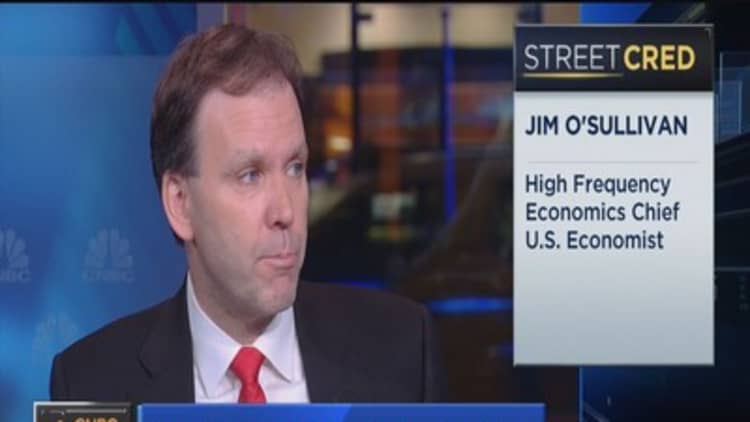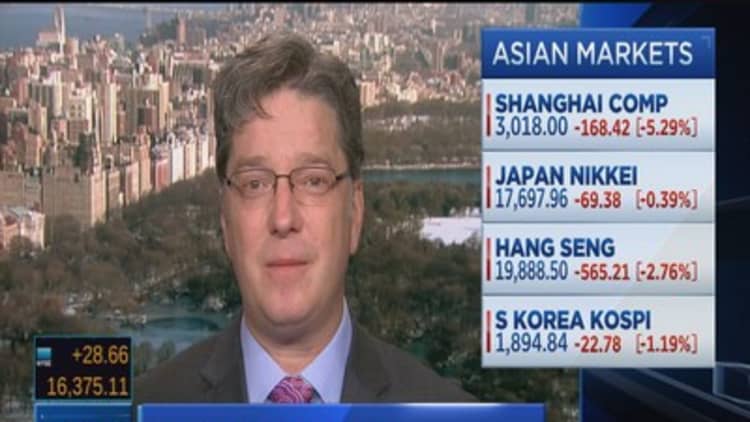
U.S. markets showed signs of recovering Monday despite a 5 percent decline in Chinese stocks, but even if traders look past an additional sell-off in Asia, they face another tough earnings season, experts told CNBC.
Last week, U.S. stocks turned in their worst first five-day opening to a year on record as China's markets slid and crude prices hit new multiyear lows.
A string of yuan devaluations in China has created a negative feedback loop, undermined currency markets and caused investors to question the ability of Chinese leaders to manage their economy, said David Lebovitz, global market strategist at JPMorgan Asset Management.
But U.S. markets were up in premarket trading before slipping in late-morning trade, despite the Asian equity tumble.
"Hopefully what we're beginning to see is investors look through a lot of the noise, which is coming out of China right now," he told CNBC's "Squawk Box." "Hopefully we're looking through that, we're focusing more on the fundamentals, we're focusing more on earnings, and as we embark on earnings season we get some positive data bringing people back into the stock market."
Ultimately, investors need to see earnings growth for markets to move higher, Lebovitz said. But the outlook is not bright.
S&P Capital IQ forecasts fourth-quarter earnings will decline 5.7 percent year over year, marking the first back-to-back quarters of earnings declines since 2009. S&P earnings fell 1.4 percent in the third quarter.
Just 4 of 10 S&P sectors — telecommunications, consumer discretionary, health care and financials — are expected to turn in positive earnings growth for the fourth quarter.
Earnings season officially kicks off on Monday when Alcoa reports after the bell.
Steve Wood, chief market strategist at Russell Investments, said 2016 will be a tough year for earnings due to continued dollar strength, the Chinese currency moves and likely acceleration of easy money policy in Japan.
"This is going to be a stock picker's environment ... I think that the volatility that we've seen over the last six months is a testament," he told CNBC's "Squawk on the Street" on Monday.
Broad U.S. equity markets will likely have another flat to slightly positive year, he said. Russell Investments is advising clients to invest in European equities first and Japan as a distant second.
"I don't think you want to bail, but you really need to do your homework right now and stick with your long-term discipline, and that gets you through some of this volatility."

The disconnect between Asian and U.S. equity performance on Monday is a sign that markets are shellshocked, said Joseph LaVorgna, Deutsche Bank's chief U.S. economist.
"The markets moved so far so quick," he said in an interview on "Squawk on the Street" on Monday.
Lavorgna noted that Friday's better-than-expected U.S. jobs report pushed the Federal Reserve toward further interest rate hikes in 2016, which he said would only hurt risk-taking.
"One has to worry about an economy that barely grew last quarter and isn't going to do that much this quarter if this continued weakness continues to weigh on the 2016 forecasts."
The U.S. economy grew 2 percent in the third quarter, the Commerce Department reported in its third and final reading last month. That was followed by a nonfarm payrolls report that showed the United States added 292,000 jobs in December.
The combination of weak real GDP growth and labor market improvement will likely put pressure on corporate margins, LaVorgna said.
It is hard to see what will push the U.S. economy toward 3 percent growth and extend the business cycle, particularly given that consumers seem to have stashed away savings at the gas pump rather than spend them in the broader economy, he added.
"The fact that consumption has not accelerated in the past year given the job growth we have and the energy price drop is telling you ... something fundamentally different is with this cycle. And I don't know what it is yet, but it's not good."



